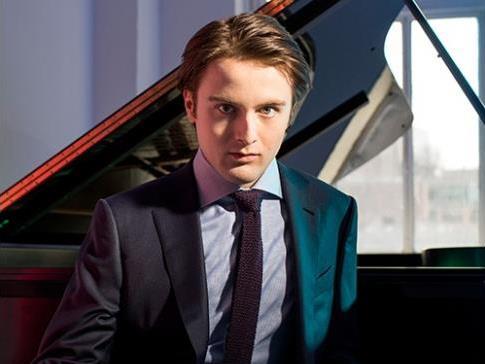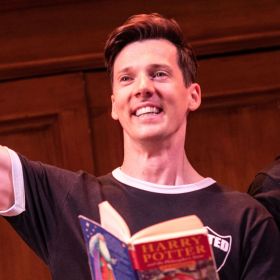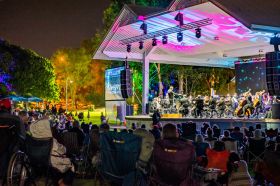Daniil Trifonov, piano. Image credit Dario Acosta via MSO.
The program comprised three scores all written within four years of one another towards the end of the 19th century: Richard Strauss’s Till Eulenspiegels lustige Streiche (Till Eulenspiegel’s Merry Pranks), Op 28, Rachmaninov’s Piano Concerto No 1 in F sharp minor, Op 1 and finally Tchaikovsky’s Symphony No 6 Pathétique.
The MSO gave a splendid account of Strauss’s light-hearted Tone Poem portraying the adventures of German Till Eulenspiegel, a genial folk hero who creates civic havoc on horseback before being captured by the authorities and hanged (complete with drum roll and scream). Particularly fine were the horns (one of Strauss’s trickiest opening flourishes), piquant clarinets and the warm sound of the strings in the final section, a tender, pure-Straussian eulogy.
Russian pianist Daniil Trifonov has presented sell-out concerto performances and recitals in Perth, Sydney and Melbourne over the past fortnight. A glance at his diary on Deutsche Grammophon’s website gives a dizzying account of performances in the world’s great halls and for important festivals over forthcoming months. It was indeed a rewarding experience to hear this 26-year-old play Rachmaninov’s first Piano Concerto. The composer started it when he was a teenage music student and although he significantly revised it twenty years later, it still brims with youthful exuberance.
Trifonov handled this Romantic showpiece with deft attention to detail, rich imagination, perfect keyboard balance and weight, an overall sense of line, and a sense of luxuriance, particularly given the evocative key. In turn, Andrew Davis marshalled a firm rapport between orchestra and the soloist. The work’s second movement Andante, a nocturne, serenely sailed in majestic splendour. The verve and energy of the final Allegro vivace was outstanding, with startling precision of passagework leading to a final blaze of F sharp major.
I admired this young artist’s modest and disciplined stage presence, always focused on the score before him. At the end he seemed genuinely elated to have contributed something really fine, spending generous time acknowledging his colleagues’ participation. The applause he received from the audience was extended and reticently acknowledged with charmingly formal slow bows.
Tchaikovsky himself led the first performance of his final Symphony in Saint Petersburg nine days before his death in October 1893. Andrew Davis introduced this performance by saying that he has always considered the work one of the composer’s “most remarkable creations”. This Symphony, whose original title is better translated as ‘passionate’ or ‘emotional’, makes no secret of the composer’s bleakly pessimistic outlook at the conclusion of his life. As a whole the work is probably best understood as an expression of infinite sadness, its brief glimpses of hope and optimism serving only as a foil to darkest despair.
Such is the case when the great military bombast of the penultimate march movement Allegro molto vivace is confronted by one of the most shocking transitions in all music when strings strike the opening chord of the Finale: Adagio lamentoso that must feel like a knife through the heart. This introduces Tchaikovsky’s last statement, full of suspensions in strings and with despairing horn cries, broken by silence like final gasps and finally, marked morendo (dying, fading away), the melody darkens into lower strings and growling brass, the silence that follows a spiritual release.
We are unused to such monumental and public outpourings of grief. There was much to be admired by this fine performance by the MSO under Andrew Davis but I could not help but feel that what was lacking here was a more palpable sense of Tchaikovsky’s heartbreak.
Rating: 4 stars
MSO Plays Tchaikovsky
Melbourne Symphony Orchestra
Andrew Davis, conductor
Daniil Trifonov, piano
Hamer Hall, Arts Centre Melbourne
Saturday, 18 March, 2017





